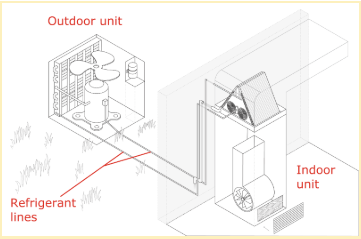Here’s the bottom line: if you have an AC system that uses R-22 refrigerant, it’s only a matter of time until you’ll need to replace your system.
Why?
Well, R-22 (also called HCFC-22) is a specific type of refrigerant that is harmful to the environment (more on this below). And, as of January 1st, 2020, the Environmental Protection Agency halted all production and importation of R-22.
To help you navigate the phaseout, we’ll explain:
- What the R-22 phaseout means
- How this phaseout will affect you
- What your choices are going forward
But first, you probably want to know if this refrigerant phaseout is even relevant to you, so we’ll start by helping you determine if your AC system uses R-22.
How do I know if my system uses R-22?
Two ways to determine whether your system uses R-22 include:
- Determine when your AC was installed. If your AC system was installed before 2010, there’s a very high possibility that your system uses R-22.
- Check your system’s nameplate. Some systems have a nameplate that identifies R-22 as the type of refrigerant your system uses.
Still can’t figure out what kind of refrigerant is in your AC system? Contact a professional. They will be able to determine what type of refrigerant your system uses and what your best options are going forward.
If you determined that your system uses R-22 (or are just curious), keep reading for how this phaseout will affect you.
What the R-22 phaseout means
R-22 is an “HCFC” (hydrochlorofluorocarbon), which is an ozone-depleting gas. The government has been slowly phasing out R-22 over the past 20 years.
At this stage of the phaseout, R-22 will no longer be produced in or imported to the U.S., making it harder to find (and likely more expensive).
Why does this matter to you?
Refrigerant is one of the most important parts of your AC system; it’s responsible for removing heat from your home’s air (which cools your home).

If there is a leak or hole in your refrigerant line, your line will need to be repaired and your refrigerant refilled. However, since 2010, the supply of R-22 has been decreasing, which means you’ll likely struggle to find R-22—and if you do, it will be very expensive.
What should I do?
If you have an AC system that uses R-22, you have 3 options:
1. Keep your current system (for now)
This will be the least expensive option in the short term, but likely the most expensive long-term.
As we mentioned above, as of January 1st, 2020, only recycled, reclaimed or previously produced R-22 can be used on your AC system….which means you can continue to repair your current system with R-22.
However, there are two issues with this option:
- Eventually, this amount of refrigerant will run out, leaving you with no other option but to install a new AC system.
- As supplies of R-22 become more limited, the price will continuously go up…and since you’re going to have to eventually replace your system, it doesn’t make sense to keep investing money in a system you’re not keeping.
2. Retrofit your current system
If you aren’t comfortable leaving your system as-is but you don’t want to invest in a completely new AC system now, you can look into retrofitting your current system for use with a non-ozone depleting refrigerant.
What does that mean? Depending on the type of AC system you have, a technician may be able to change your system to support an alternative type of refrigerant.
While this is a good, temporary fix, if your current system uses R-22, it’s like 10+ years old, which means you’re putting money into retrofitting a system that you’ll need to replace in the next 1-5 years.
3. Install a new system
This will be the most expensive option upfront, but will likely save you the most money in the long-run.
How?
- If you proactively plan to install a new AC system rather than reactively installing a new AC system, you’ll probably save money on service fees (not paying for emergency or rush service)
- Newer AC systems are more efficient than older ones, meaning you’ll save money on monthly energy bills with a system that uses less energy to produce the same results.
Still not sure what to do? We get it! Call a team you can trust: Air Experts!
We understand that this phaseout is confusing, and you’re probably unsure of which option is best for you short term and long term. Our team has been in this industry for a long time (25 years), and we’re happy to help you figure out which solution is best for you.
Want to learn more about the phaseout? Read these articles from the EPA:
